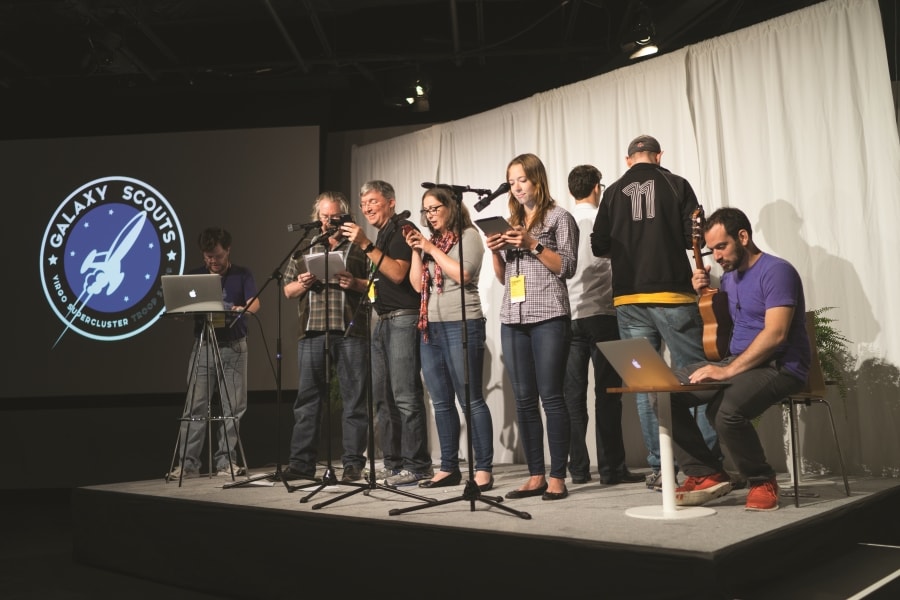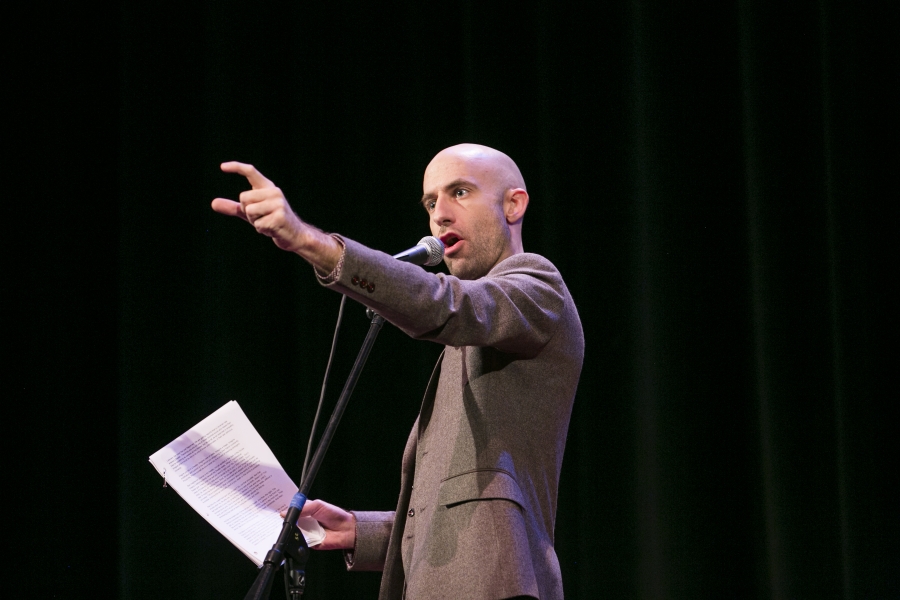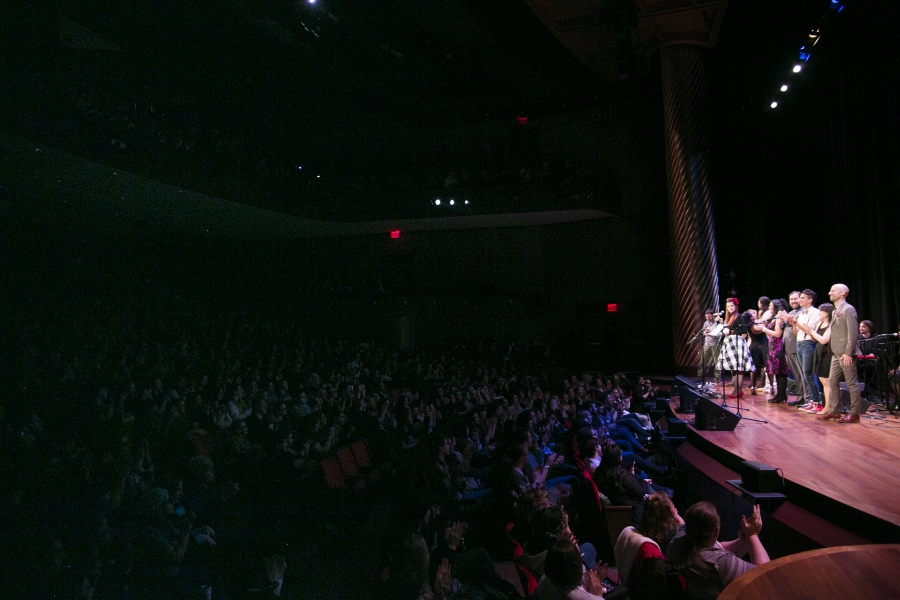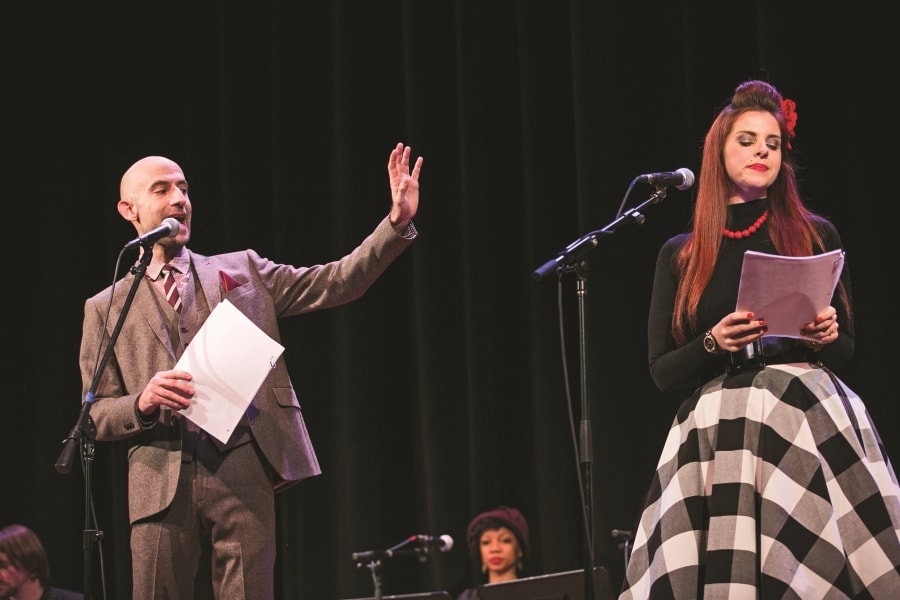Following podcasts has become a fixture of our culture consumption, so much so that for many of us it has supplanted radio listening. Consider that when the hour-long narrative radio program This American Life debuted in 1995, it reached us solely via public radio; it is now the most popular podcast in the country, downloaded 2.5 million times each week. And in 2014, its popular spinoff, Serial, was offered as a podcast only, with the freedom of delivery and length that the form allows. The low overhead and ease of adoption has made podcasts a natural platform for media outlets, corporate brands, and print publications (including American Theatre).
On top of offering a new venue for news and broadcast journalism, podcasts have become a platform for the resurrection of the radio drama, with fictionalized shows on the growing list in the Modern Radio Drama category on iTunes. For theatre artists, the podcast medium has created a new way to employ skills of writing, producing, and performing for the stage on a much smaller budget—and for a much bigger audience.
Naked Angels theatre in New York City began its podcast Naked Radio in 2010 as a way to provide playwrights with a writers’ room and an outlet to share new work. “Radio and theatre are both very antiquated mediums in their own regard, and the fact that radio is now having this incredible renaissance and that people are yearning to tie these together makes a lot of sense,” says Naked Angels producing consultant Liz Carlson.
In 2012 the Incomparable, a network of podcasts, brought in playwright David J. Loehr to create a 1940s radio-inspired audio play for an April Fool’s episode. The segment spawned its own podcast, the Incomparable Radio Theater, melding the style of 20th-century radio broadcasts with Loehr’s dramatic skills. Loehr took inspiration from BBC Radio, which has been doing radio dramas for ages, with comic talk shows, holiday programs, and audio plays. “It has just been continuous from the beginning of the BBC,” says Loehr. “All the great playwrights have been writing for radio all this time—Tom Stoppard has collections of radio plays.”
In particular, Loehr was excited by the ability to create cliffhangers between podcast episodes. The radio play, as it turns out, is ripe for the upsurge in serialized fictional podcasts.
“What is surprising about this is that it is nontraditional theatre, and yet has its roots in traditional theatre,” says Cecil Baldwin, who voices the narrator on the science-fiction podcast Welcome to Night Vale. The podcast, structured like a news broadcast, is interwoven with reports on the conspiracies, hooded figures, and eerie events overtaking the hot desert town.

Playwright Mac Rogers also owes inspiration to BBC Radio, for its audio remounting of Doctor Who,” that, as well as Orson Welles’s seminal The War of the Worlds broadcast, was a major touchstone when he was hired to write Panoply and GE’s science-fiction podcast The Message in 2015. The podcast miniseries, since ended, followed a group of decoders attempting to decipher a message sent by extraterrestrials. “As it happened, [podcasts] had been a huge hobby of mine before I started writing it,” says Rogers. “I had a lot of creative time to think about the ways in which to do good audio writing and to really take advantage of the medium.”
The audio format seemed daunting at first—until Rogers discovered its impressive creative flexibility. “I love that the format is boundless. You can have anything happen in a story as long as you can make it sound like that thing is happening—just enough to spark people’s imaginations.”
Ultimately Rogers found the distance between creating and producing theatre and writing, recording, and releasing podcasts to be a short one. “My bread and butter as a stage dramatist is extended multi-character scenes, where you have five to six people onstage, there is a big suspenseful event happening, and everyone onstage has their own agenda with regard to it,” says Rogers. When he realized it was possible to write similar scenes for audio, the challenge didn’t seem so daunting. “The types of scenes that I had been writing for the stage for a long time, I could now write for audio with a great deal of comfort in them—I had honed those instincts.”
The creators and cowriters of the podcast Welcome to Night Vale, Joseph Fink and Jeffrey Cranor, also have a background in theatre. Playwright Fink met Cranor when the latter was performing with the New York Neo-Futurists, an ensemble of writers and performers who dispel the notion of suspending disbelief. “Neo-Futurism, and a lot of experimental theatre, is often task-based,” says Cranor. “You have this task of writing challenges along with thinking in terms of scenes and language, and thinking of what the challenge is.”
Carlson, who produces Naked Radio, says it’s exciting to see how the podcast format pushes writers to use their theatrical toolkit in new ways. “Because you are removing all the visual in a podcast, any stage direction is an audio cue instead of a physical piece of staging or lighting,” says Carlson. “It is honing in on the particular craftsmanship of dialogue, of tempo, and how you can be a character through the sound of your voice.”

Cecil Baldwin, also a member of the New York Neo-Futurist ensemble, brings his experience onstage to his work behind the microphone. As the narrator in Welcome to Night Vale, he approaches his copy as a long monologue when recording. “I prefer the more organic performance style of starting each page and seeing how far I can get without messing up,” says Baldwin. Because he records his voice part on his own, there is also a great deal of self-directing that comes into play—another tool from his theatre background. “There is an inherent theatricality [to making a podcast], and the fact that we are all theatre artists, for the most part, shines through in how we make this show,” says Baldwin.
Will Rogers, Sarah Burgess, Bekah Brunstetter, and Lauren Blumenfeld are among the playwrights who’ve contributed to Naked Angels’ Naked Radio. The podcast is curated with audio plays, sketch comedy, and musical performances, with themes inspired by concepts of new plays or upcoming productions. For example, Naked Angels paired with Woolly Mammoth Theatre Company of Washington, D.C., for an episode themed around an upcoming 2010 production of House of Gold at Woolly. “The podcast serves as a wonderful medium for us to collaborate with other like-minded, new-work-bent companies, and we would partner by using writers in their writers’ group, or have them curate an episode with us and then we get to work together as a company,” says Liz Carlson. The podcast has also led to collaborations with Clubbed Thumb, Ensemble Studio Theatre, and Ma-Yi Theater Company, among others. “The really incredible thing about podcasting is that when you have a strong team, the timeline from creation to public consumption is a little shorter than what we are used to in the theatrical medium,” says Carlson.
Indeed, the bar for entry to creating podcasts is low. Welcome to Night Vale’s initial costs were a $75 microphone and a minimal web-hosting fee. The creative team uses Audacity and GarageBand, both free programs, for editing and recording. For the Incomparable Radio Theater, David J. Loehr uses a $120 Yeti mic by Blue Microphones, $80 earphones, and the software Adobe Audition.* “There is something kind of magical about —if you can get your hands on a microphone and a computer, you can make an artistic endeavor that has the potential to be heard by literally billions of people,” says Cecil Baldwin.
Case in point: Mac Rogers’s podcast The Message was produced by the advertising network agency BBDO, General Electric, and Panoply. “They had the marketing muscle to get it out there to a lot of people,” says Rogers. “By the end, quite a lot of people were listening. By the middle of the year, the download number was astonishing to me—it had reached 4 million people, making it by far the most widely exposed piece of writing I’ve ever had anything to do with.” Second place, Rogers’s series of plays The Honeycomb Trilogy at the Gym at Judson in NYC brought in a few hundred audience members in 2015.

It’s probably not surprising, given the creators’ theatrical origins, that some of these podcasts are bringing the medium to the stage. Welcome to Night Vale has presented live shows of the podcast around the globe, and the show is embarking on an international tour with some uncharted stops, including Madrid, Warsaw, and Prague. The tour is even set to perform at the London Palladium in the West End, a 2,286-seat venue.
“Joseph and Jeffrey have been very bold in the way that they have used live theatre to impact these live radio-drama performances,” says Baldwin. And while the performers are in plain clothes behind microphones and music stands, the fans arrive clad in costumes inspired by the podcast: “glow clouds” and angels on stilts fill the audiences.
Early Welcome to Night Vale live shows in churches, bars, and theatre venues across the country introduced some young listeners and sci-fi enthusiasts to theatre. “We’ve created this show that exists in the podcast format, and mostly podcasts are meant to be listened to by yourself—in your car, in your earbuds, while you are at work, etc.,” says Baldwin. “All of a sudden, here is a chance to get into a room with a bunch of people who also listen to the same thing that you listen to, but now you are going to experience it as a community.” The experience is akin to, well, theatre.
Naked Radio has embraced the old-school style of sound engineering for its live holiday shows. “The format is slightly different; you typically have a live Foley artist or sound effects artists, percussionist, musician, or combination thereof,” says Carlson. “It is definitely more complicated, but fun.”
The Incomparable Radio Theater has performed at the Red Bicycle Hall in Madison, Ind., writer Loehr’s home base. “Watching how Welcome to Night Vale has taken off has been a great role model in how to make this happen and grow,” he says. Loehr has plans to present the live show at other theatres around the country. Muses Loehr, “The striking thing about podcasts is that almost none of them are based in theatre companies, even though they are full of theatre people. Why aren’t the regional theatre companies embracing this? This is something I could take to any regional theatre in the country. Put it in a black box, give us one of your local bands and some actors, and we will record it. We’ll push it out to the people on the network.”
Joseph Fink and Jeffrey Cranor of Welcome to Night Vale are on the same page. “There are so many regional theatres that don’t produce new work in America, and it is frustrating,” says Cranor. “As a playwright, it is supremely frustrating to be able to find some way to put your work out—and something like Welcome to Night Vale could be adapted as a full onstage play.” Fink adds, “It is way easier to get the interest of larger producers and companies once you have found your own audience producing your own work.”
Indeed, The Message has given Rogers a platform to showcase his other work. Having written numerous unproduced screenplays and pilots, Rogers now has a successful body of work to point producers to. “It is unusual for me to have a piece of permanent media that exists out there,” says Rogers.
Prior to traveling the globe with Welcome to Night Vale, Baldwin, like many professional artists, was juggling three part-time jobs in New York City. He was also working full-time with the New York Neo-Futurists, writing plays weekly and performing Too Much Light Makes the Baby Go Blind every Friday and Saturday night. Now the podcast is providing a living, and he is also booking voiceovers that take advantage of his booming radio voice.
Welcome to Night Vale is also now a novel—yet another platform that’s a natural fit for this new medium. “We live in this wonderful time now that you can get your stories out there,” says Cranor. “You don’t have to go through the old model of having to get a publisher to publish your book or a producer to produce your play. I think it is great that more people are moving to podcasting; it is a welcoming environment.” In addition to the novel the creators released a two-part book series about the making of Welcome to Night Vale, including the episode scripts and behind-the-scenes peeks at the production process, on Sept. 9.
Perhaps for theatre people, the best part of creating podcasts is what Rogers alluded to: There is no closing date or strike, and the work lives on.
“One of the great things about theatre and also one of the tyrannies of theatre is that it is ephemeral,” says Baldwin. “If you do a play, it runs for two weeks, a month. But the great thing about making a podcast is that it is always out there. People who have never heard of the podcast can start at Episode One and go on the journey at their own pace.” Rogers is disappointed when friends miss the production run of one of his plays, but they can tune in at any time to hear his podcast. “Listen to it whenever you get to it,” he says. “It is not closing on Saturday the 24th or something like that. It will be there until the fossil fuels run out and civilization falls apart—as long as you listen to it by then, you’re good.”
Oh, one other way it’s different from the theatre: There is no need to turn off your phone.
A version of this story appears in the September 2016 issue of American Theatre.
*An earlier version of this story misstated that Adobe Audition was a free program. First-time users Adobe Creative Cloud can download a limited free trial of the application. American Theatre regrets the error.


